Psychological therapies for depression in older adults residing in long-term care settings
- PMID: 38501686
- PMCID: PMC10949416
- DOI: 10.1002/14651858.CD013059.pub2
Psychological therapies for depression in older adults residing in long-term care settings
Abstract
Background: Depression is common amongst older people residing in long-term care (LTC) facilities. Currently, most residents treated for depression are prescribed antidepressant medications, despite the potential availability of psychological therapies that are suitable for older people and a preference amongst many older people for non-pharmacological treatment approaches.
Objectives: To assess the effect of psychological therapies for depression in older people living in LTC settings, in comparison with treatment as usual, waiting list control, and non-specific attentional control; and to compare the effectiveness of different types of psychological therapies in this setting.
Search methods: We searched the Cochrane Common Mental Disorders Group Controlled Trials Register, CENTRAL, MEDLINE, Embase, five other databases, five grey literature sources, and two trial registers. We performed reference checking and citation searching, and contacted study authors to identify additional studies. The latest search was 31 October 2021.
Selection criteria: We included randomized controlled trials (RCTs) and cluster-RCTs of any type of psychological therapy for the treatment of depression in adults aged 65 years and over residing in a LTC facility.
Data collection and analysis: Two review authors independently screened titles/abstracts and full-text manuscripts for inclusion. Two review authors independently performed data extraction and risk of bias assessments using the Cochrane RoB 1 tool. We contacted study authors for additional information where required. Primary outcomes were level of depressive symptomatology and treatment non-acceptability; secondary outcomes included depression remission, quality of life or psychological well-being, and level of anxious symptomatology. We used Review Manager 5 to conduct meta-analyses, using pairwise random-effects models. For continuous data, we calculated standardized mean differences and 95% confidence intervals (CIs), using endpoint data, and for dichotomous data, we used odds ratios and 95% CIs. We used GRADE to assess the certainty of the evidence.
Main results: We included 19 RCTs with 873 participants; 16 parallel group RCTs and three cluster-RCTs. Most studies compared psychological therapy (typically including elements of cognitive behavioural therapy, behavioural therapy, reminiscence therapy, or a combination of these) to treatment as usual or to a condition controlling for the effects of attention. We found very low-certainty evidence that psychological therapies were more effective than non-therapy control conditions in reducing symptoms of depression, with a large effect size at end-of-intervention (SMD -1.04, 95% CI -1.49 to -0.58; 18 RCTs, 644 participants) and at short-term (up to three months) follow-up (SMD -1.03, 95% CI -1.49 to -0.56; 16 RCTs, 512 participants). In addition, very low-certainty evidence from a single study with 82 participants indicated that psychological therapy was associated with a greater reduction in the number of participants presenting with major depressive disorder compared to treatment as usual control, at end-of-intervention and short-term follow-up. However, given the limited data on the effect of psychological therapies on remission of major depressive disorder, caution is advised in interpreting this result. Participants receiving psychological therapy were more likely to drop out of the trial than participants receiving a non-therapy control (odds ratio 3.44, 95% CI 1.19 to 9.93), which may indicate higher treatment non-acceptability. However, analyses were restricted due to limited dropout case data and imprecise reporting, and the finding should be interpreted with caution. There was very low-certainty evidence that psychological therapy was more effective than non-therapy control conditions in improving quality of life and psychological well-being at short-term follow-up, with a medium effect size (SMD 0.51, 95% CI 0.19 to 0.82; 5 RCTs, 170 participants), but the effect size was small at postintervention (SMD 0.40, 95% CI -0.02 to 0.82; 6 RCTs, 195 participants). There was very low-certainty evidence of no effect of psychological therapy on anxiety symptoms postintervention (SMD -0.68, 95% CI -2.50 to 1.14; 2 RCTs, 115 participants), although results lacked precision, and there was insufficient data to determine short-term outcomes.
Authors' conclusions: This systematic review suggests that cognitive behavioural therapy, behavioural therapy, and reminiscence therapy may reduce depressive symptoms compared with usual care for LTC residents, but the evidence is very uncertain. Psychological therapies may also improve quality of life and psychological well-being amongst depressed LTC residents in the short term, but may have no effect on symptoms of anxiety in depressed LTC residents, compared to control conditions. However, the evidence for these effects is very uncertain, limiting our confidence in the findings. The evidence could be strengthened by better reporting and higher-quality RCTs of psychological therapies in LTC, including trials with larger samples, reporting results separately for those with and without cognitive impairment and dementia, and longer-term outcomes to determine when effects wane.
Copyright © 2024 The Cochrane Collaboration. Published by John Wiley & Sons, Ltd.
Conflict of interest statement
TD: reports publishing a literature review and opinion piece with relevance to the topic of the effectiveness of psychological therapies in long‐term care in Australian Psychologist which advocates for increased access to psychologists in this setting, and involvement in an ongoing trial that is eligible for this review (Bhar 2023).
SBh: reports involvement in an ongoing trial that is eligible for this review (Bhar 2023).
YW: none.
PO: none.
EY: none.
CD: receives funding from the National Health & Medical Research Council to investigate the effect of a social intervention on depression in nursing home residents but the trial is ongoing and not eligible for inclusion in this review.
SBo: none.
LF: reports being a Cochrane Editor (specifically in the Cochrane Dementia and Cognitive Improvement Group), with no involvement in the editorial process of the article, and also reports involvement in an ongoing trial that is eligible for this review (Velasquez Reyes 2019).
Figures
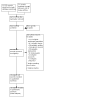
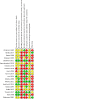
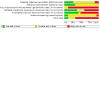
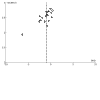
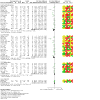
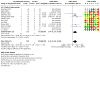
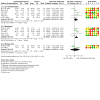
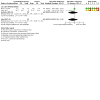
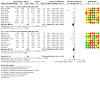
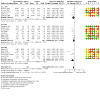
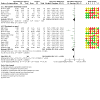
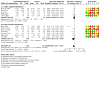
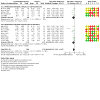
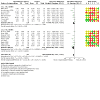
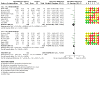
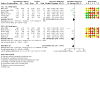
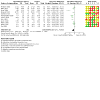
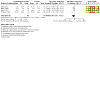
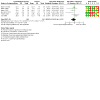
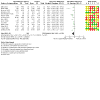
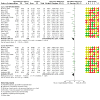
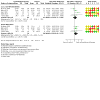
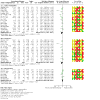
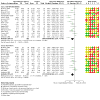
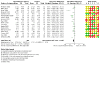
Update of
- doi: 10.1002/14651858.CD013059
Similar articles
-
E-Health interventions for anxiety and depression in children and adolescents with long-term physical conditions.Cochrane Database Syst Rev. 2018 Aug 15;8(8):CD012489. doi: 10.1002/14651858.CD012489.pub2. Cochrane Database Syst Rev. 2018. PMID: 30110718 Free PMC article.
-
Psychological therapies for the treatment of mental disorders in low- and middle-income countries affected by humanitarian crises.Cochrane Database Syst Rev. 2018 Jul 5;7(7):CD011849. doi: 10.1002/14651858.CD011849.pub2. Cochrane Database Syst Rev. 2018. PMID: 29975811 Free PMC article.
-
Non-pharmacological interventions for somatoform disorders and medically unexplained physical symptoms (MUPS) in adults.Cochrane Database Syst Rev. 2014 Nov 1;2014(11):CD011142. doi: 10.1002/14651858.CD011142.pub2. Cochrane Database Syst Rev. 2014. PMID: 25362239 Free PMC article.
-
Psychological therapies for women who experience intimate partner violence.Cochrane Database Syst Rev. 2020 Jul 1;7(7):CD013017. doi: 10.1002/14651858.CD013017.pub2. Cochrane Database Syst Rev. 2020. PMID: 32608505 Free PMC article.
-
Psychological treatments for depression and anxiety in dementia and mild cognitive impairment.Cochrane Database Syst Rev. 2022 Apr 25;4(4):CD009125. doi: 10.1002/14651858.CD009125.pub3. Cochrane Database Syst Rev. 2022. PMID: 35466396 Free PMC article.
Cited by
-
Efficacy of therapeutic intervention with NanoBEO to manage agitation and pain in patients suffering from severe dementia: a pilot clinical trial.Front Pharmacol. 2024 Aug 1;15:1417851. doi: 10.3389/fphar.2024.1417851. eCollection 2024. Front Pharmacol. 2024. PMID: 39148533 Free PMC article.
-
Depression, Loneliness and Quality of Life in Institutionalised and Non-Institutionalised Older Adults in Portugal: A Cross-Sectional Study.Nurs Rep. 2024 Sep 10;14(3):2340-2354. doi: 10.3390/nursrep14030174. Nurs Rep. 2024. PMID: 39311182 Free PMC article.
-
The impact of depression and associated anxiety symptoms on clinical outcomes in elderly inpatients with digestive system diseases in Southwest China: a retrospective cohort study.BMC Psychiatry. 2025 Jun 6;25(1):585. doi: 10.1186/s12888-025-07038-1. BMC Psychiatry. 2025. PMID: 40481469 Free PMC article.
-
Non-pharmacological Approaches to Depressed Elderly With No or Mild Cognitive Impairment in Long-Term Care Facilities. A Systematic Review of the Literature.Front Public Health. 2021 Jul 16;9:685860. doi: 10.3389/fpubh.2021.685860. eCollection 2021. Front Public Health. 2021. PMID: 34336772 Free PMC article.
-
Behavioural activation in nursing homes to treat depression (BAN-Dep): study protocol for a pragmatic randomised controlled trial.BMJ Open. 2019 Oct 31;9(10):e032421. doi: 10.1136/bmjopen-2019-032421. BMJ Open. 2019. PMID: 31676658 Free PMC article.
References
References to studies included in this review
Abraham 1992 {published data only}
Bailey 2017 {published data only (unpublished sought but not used)}
Daleo 1999 {published data only}
-
- Daleo DV. The effects of structured reminiscent group therapy with depressed elderly in a nursing home context. ProQuest Dissertations and Theses 1999;(9933439):259.
Dhooper 1993 {published data only}
-
- Dhooper SS, Green SM, Huff MB, Austin-Murphy J. Efficacy of a group approach to reducing depression in nursing home elderly residents. Journal of Gerontological Social Work 1993;20(3-4):87-100.
Dozeman 2011 {published data only (unpublished sought but not used)}
-
- Dozeman E, Schaik DJ, Marwijk HW, Stek ML, Beekman AT, Horst HE. Feasibility and effectiveness of activity-scheduling as a guided self-help intervention for the prevention of depression and anxiety in residents in homes for the elderly: a pragmatic randomized controlled trial [ISRCTN27540731]. International Psychogeriatrics 2011;23(6):969-78. [DOI: 10.1017/S1041610211000202] - DOI - PubMed
Hamzehzadeh 2018 {published data only (unpublished sought but not used)}
-
- Hamzehzadeh M, Golzari M, Rafiemanesh H, Meshki V, Abdolalizadeh M, Hoseini L, et al. Investigating the effectiveness of reminiscence therapy on of elderlies depression and optimism: an experiment study. La Prensa Medica Argentina 2018;104(6):104-6. [DOI: ]
Hansen 1976 {published data only}
-
- Hansen JJ. A Didactic Group Therapy Program for the Treatment of Depression [Masters thesis]. Charleston (Illinois): Eastern Illinois University, 1976.
Hussian 1979 {published data only}
-
- Hussian RA, Lawrence PS. Social reinforcement of activity and problem-solving training in the treatment of depressed institutionalized elderly patients. Cognitive Therapy and Research 1981;5(1):57-69. [DOI: 10.1007/BF01172326] - DOI
-
- Hussian RA. Social reinforcement of activity and problem-solving training in the treatment of depressed institutionalized elderly patients. Dissertation Abstracts International 1979;39(7-B):3517-18.
Hyer 2009 {published data only (unpublished sought but not used)}
Karimi 2010 {published data only (unpublished sought but not used)}
-
- Karimi H, Dolatshahee B, Momeni K, Khodabakhshi A, Rezaei M, Kamrani AA. Effectiveness of integrative and instrumental reminiscence therapies on depression symptoms reduction in institutionalized older adults: an empirical study. Aging & Mental Health 2010;14(7):881-7. [DOI: 10.1080/13607861003801037] - DOI - PubMed
Luo 2020 {published data only (unpublished sought but not used)}
Meeks 2008 {published and unpublished data}
-
- NCT00056485. Treatment of depression in nursing homes. clinicaltrials.gov/show/nct00056485 (first received 17 March 2003).
Meeks 2015 {published and unpublished data}
-
- NCT00536406. Evaluating a behavioral activities treatment program for depressed nursing home residents. clinicaltrials.gov/show/nct00536406 (first received 27 September 2007).
Reinhardt 2014 {published data only (unpublished sought but not used)}
Rosen 1997 {published data only}
Sales 2015 {published data only (unpublished sought but not used)}
-
- Sales A, Atienzar AP, Mayordomo T, Satorres-Pons E, Melendez JC. Effects of cognitive behavioral therapy on depression in institutionalized elderly [Efectos de la terapia cognitivo-conductual sobre la depresion en personas mayores institucionalizadas]. Revista de Psicopatología y Psicología Clínica 2015;20(2):165-72. [DOI: 10.5944/rppc.vol.20.num.2.2015.15170] - DOI
Travers 2017 {published data only (unpublished sought but not used)}
-
- ACTRN12613000296730. Having more fun: increasing enjoyable activities to treat depression in nursing home residents with Alzheimer's disease: a pilot study. www.anzctr.org.au/Trial/Registration/TrialReview.aspx?ACTRN=12613000296730 (first received 11 March 2013).
Tsai 2008 {published data only (unpublished sought but not used)}
Zerhusen 1991 {published data only}
-
- Zerhusen JD, Boyle K, Wilson W. Out of the darkness: group cognitive therapy for depressed elderly. Journal of Psychosocial Nursing and Mental Health Services 1991;29(9):16-21. - PubMed
References to studies excluded from this review
Ahmadpanah 2017 {published and unpublished data}
Crespy 2016 {published data only}
Fry 1984 {published data only}
-
- Fry PS. Cognitive training and cognitive-behavioral variables in the treatment of depression in the elderly. Clinical Gerontologist 1984;3(1):25-45. [DOI: 10.1300/J018v03n01_04] - DOI
Hsu 2009 {published data only}
Hsu 2019 {published and unpublished data}
Kim 1999 {published data only}
-
- Kim YH. The effect of group recreation therapy on depression, self-esteem and life satisfaction of the elderly. Journal of Korean Community Nursing 1999;10(1):19-31.
Konnert 2009 {published data only}
Sood 2003 {published data only}
-
- Sood JR, Cisek E, Zimmerman J, Zaleski EH, Fillmore HH. Treatment of depressive symptoms during short-term rehabilitation: an attempted replication of the DOUR Project. Rehabilitation Psychology 2003;48:44-9. [DOI: 10.1037/0090-5550.48.1.44] - DOI
Tesky 2019 {published data only}
-
- Tesky VA, Schall A, Schulze U, Stangier U, Oswald F, Knopf M, et al. Depression in the nursing home: a cluster-randomized stepped-wedge study to probe the effectiveness of a novel case management approach to improve treatment (the DAVOS project). Trials [Electronic Resource] 2019;20(1):424. [DOI: 10.1186/s13063-019-3534-x] - DOI - PMC - PubMed
Wilson 2010 {published data only}
References to studies awaiting assessment
Bai 2018 {published data only (unpublished sought but not used)}
-
- Bai Z, Shen J. Application of individual reminiscence therapy and group reminiscence therapy in elderly patients with depression in nursing homes. www.chictr.org.cn/showproj.aspx?proj=32031 (first received 20 October 2018).
Funaki 2011 {published data only (unpublished sought but not used)}
-
- Funaki Y, Kaneko F, Hanaoka H, Hirasawa R, Okamura H. Effect of group reminiscence therapy using active touch on cognitive function in the elderly. Asian Journal of Psychiatry 2011;4:S75. [DOI: 10.1016/S1876-2018%2811%2960289-X] - DOI
Khezri Moghadam 2018 {published and unpublished data}
-
- Khezri Moghadam N, Vahidi S, Ashormahani M. Efficiency of cognitive-existential group therapy on life expectancy and depression of elderly residing in nursing homes. Iranian Journal of Ageing 2018;13(1):62-73. [DOI: 10.21859/sija.13.1.62] - DOI
Lemos 2016 {published data only (unpublished sought but not used)}
-
- Lemos L, Espírito-Santo H, Simões S, Silva F, Galhardo J, Oliveira M, et al. A neuropsychological group rehabilitation program with institutionalized elderly. European Psychiatry 2016;33(Suppl):S235. [DOI: 10.1016/j.eurpsy.2016.01.588] - DOI
Lopes 2017 {published data only (unpublished sought but not used)}
-
- Lopes TS. Reminiscence therapy effects in older persons with mild dementia. Alzheimer's and Dementia 2017;13(7 Suppl):P4-321.
Pang 2020 {unpublished data only}
-
- Pang Y. Efficacy of supportive self-management in alleviating depressive states in the elderly. www.chictr.org.cn/showproj.aspx?proj=62484 (first received 10 October 2020).
Sturz 2015 {published data only (unpublished sought but not used)}
-
- Sturz K, Hartmann S, Kemmler G, Gunther V. Influence of a relaxation program, cognitive training and a combination of both intervention forms on neuropsychological and affective parameters in elderly care home residents. European Psychiatry 2015;30:1447. [DOI: 10.1016/S0924-9338(15)31121-4] - DOI
References to ongoing studies
Bhar 2023 {published data only}
-
- ACTRN12619001037190. Cognitive-behavioral therapy for depressive symptoms in older adults living in residential aged care facilities: a cluster randomised-controlled trial in Australia. anzctr.org.au/Trial/Registration/TrialReview.aspx?ACTRN=12619001037190 (first received 4 July 2019).
-
- Bhar S, Davison TE, Schofield P, Quinn S, Ratcliffe J, Waloszek JM, et al. Study protocol for ELders AT Ease (ELATE): a cluster randomised controlled trial of cognitive behaviour therapy to reduce depressive symptoms in aged care residents. BMC Geriatrics 2023;23(1):555. [DOI: 10.1186/s12877-023-04257-7] - DOI - PMC - PubMed
Velasquez Reyes 2019 {published data only}
-
- Almeida OP, Patel H, Velasquez D, Kelly R, Lai R, Ford AH, et al. Behavioral activation in nursing homes to treat depression (BAN-Dep): results from a clustered, randomized, single-blinded, controlled clinical trial. American Journal of Geriatric Psychiatry 2022;30(12):1313-23. [DOI: 10.1016/j.jagp.2022.05.009] - DOI - PubMed
Additional references
Abrams 1992
Achterberg 2006
Aged Care Financing Authority 2021
-
- Aged Care Financing Authority. Ninth report on the Funding and Financing of the Aged Care Sector. Australian Government Department of Health June 2021.
Alexopoulos 1988
-
- Alexopoulos GS, Abrams RC, Young RC, Shamoian CA. Cornell scale for depression in dementia. Biological Psychiatry 1988;23(3):271-84. - PubMed
Almeida 2022
-
- Almeida OP, Patel H, Velasquez D, Kelly R, Lai R, Ford AH, et al. Behavioral activation in nursing homes to treat depression (BAN-Dep): results from a clustered, randomized, single-blinded, controlled clinical trial. American Journal of Geriatric Psychiatry 2022;30(12):1313-23. [DOI: 10.1016/j.jagp.2022.05.009] - DOI - PubMed
Amare 2020
-
- Amare AT, Caughey GE, Whitehead C, Lang CE, Bray SC, Corlis M, et al. The prevalence, trends and determinants of mental health disorders in older Australians living in permanent residential aged care: implications for policy and quality of aged care services. Australian and New Zealand Journal of Psychiatry 2020;54(12):1200-11. [DOI: 10.1177/0004867420945367] - DOI - PubMed
Anstey 2007
-
- Anstey KJ, Sanden C, Sargent-Cox K, Luszcz MA. Prevalence and risk factors for depression in a longitudinal, population-based study including individuals in the community and residential care. American Journal of Geriatric Psychiatry 2007;5(6):497-505. [DOI: 10.1097/JGP.0b013e31802e21d8] - DOI - PubMed
APA 2013
-
- American Psychiatric Association. Diagnostic and Statistical Manual of Mental Disorders. 5th edition. Washington (DC): American Psychiatric Association, 2013.
Banerjee 2011
Barca 2010
Beck 1961
Beck 1979
-
- Beck AT, Rush J, Shaw B. Cognitive Therapy of Depression. New York (NY): Guildford, 1979.
Beekman 2002
Beerens 2013
Bhar 2020
-
- Bhar S, Koder D, Davison T, Kelly J, Jayaram H, Silver M, et al. A clinician's quick guide of evidence-based approaches: psychological treatments for depression and anxiety with older adults living in residential aged care facilities. Clinical Psychologist 2020;24(2):206-7. [DOI: 10.1111/cp.12229] - DOI
Bharucha 2006
Boyce 2012
Boyle 2004
-
- Boyle VL, Roychoudhury C, Beniak R, Cohn L, Bayer A, Katz I. Recognition and management of depression in skilled-nursing and long-term care settings: evolving targets for quality improvement. American Journal of Geriatric Psychiatry 2004;12(3):288-95. [DOI: 10.1097/00019442-200405000-00008] - DOI - PubMed
Brink 1982
-
- Brink TL, Yesavage JA, Owen L, Heersema P, Aey M, Rose TL. Screening tests for geriatric depression. Clinical Gerontologist 1982;1:37-43. [DOI: ]
Brownie 2014
Busch 2016
-
- Busch F, Rudden M, Shapiro T. Psychodynamic Treatment of Depression. 2nd edition. Arlington (VA): American Psychiatric Association Publishing, 2016. [DOI: 10.1016/j.psc.2012.01.001] - DOI
Butler 1963
Charlemagne‐Badal 2015
-
- Charlemagne-Badal SJ, Lee JW, Butler TL, Fraser GE. Conceptual domains included in wellbeing and life satisfaction instruments: a review. Applied Research in Quality Life 2015;10:305-28. [DOI: 10.1007/s11482-014-9306-6] - DOI
Chou 2001
-
- Chou K-L, Chi I, Leung AC, Wu YM, Liu C-P. Validation of minimum data set for nursing home in Hong Kong Chinese elders. Clinical Gerontologist 2001;23:43-54. [DOI: 10.1300/J018v23n01_05] - DOI
Cody 2013
-
- Cody RA, Drysdale K. The effects of psychotherapy on reducing depression in residential aged care: a meta-analytic review. Clinical Gerontologist 2013;36(1):46-69. [DOI: 10.1080/07317115.2012.731474] - DOI
Cohen‐Mansfield 1989
Creighton 2018
Cuijpers 2014
Cumming 1994
Davison 2007
Davison 2009
Davison 2012
Davison 2016
-
- Davison TE, Koder D, Helmes E, Doyle C, Bhar S, Mitchell L, et al. Brief on the role of psychologists in residential and home care services for older adults. Australian Psychologist 2016;52(6):397-405. [DOI: 10.1111/ap.12209] - DOI
Davison 2021a
Davison 2021b
-
- Davison TE, McCabe MP, Busija L, Graham A, Camões-Costa V, Kelly J, et al. The effectiveness of the Program to Enhance Adjustment to Residential Living (PEARL) in reducing depression in newly admitted nursing home residents. Journal of Affective Disorders 2021;282:1067-75. [DOI: 10.1016/j.jad.2020.12.087] - DOI - PubMed
de Shazer 1988
-
- Shazer S. Clues: Investigating Solutions in Brief Therapy. New York (NY): WW Norton & Co, 1988.
Deeks 2019
-
- Deeks JJ, Higgins JP, Altman DG, editor(s), Cochrane Statistical Methods Group. Chapter 10: Analysing data and undertaking meta-analyses. In: Higgins JP, Thomas J, Chandler J, Cumpston M, Li T, Page MJ, Welch VA, editor(s). Cochrane Handbook for Systematic Reviews of Interventions Version 6.0 (updated July 2019). Cochrane, 2019. Available from training.cochrane.org/handbook/archive/v6.
Diener 1985
Dorenlot 2005
Doyle 2021
Endicott 1978
-
- Endicott J, Spitzer RL. A diagnostic interview: the schedule for affective disorders and schizophrenia. Archives of General Psychiatry 1978;35(7):837-44. - PubMed
EPOC 2017
-
- Cochrane Effective Practice and Organisation of Care (EPOC). Data collection form. EPOC resources for review authors. Available from epoc.cochrane.org/epoc-specific-resources-review-authors (last accessed 20 November 2023).
First 2016
-
- First MB, Williams JB, Karg RS, Spitzer RL. User's Guide for the Structured Clinical Interview for DSM-5 Disorders – Clinician Version (SCID-5-CV). Arlington (VA): American Psychiatric Association, 2016.
Folstein 1975
-
- Folstein MF, Folstein SE, McHugh PR. "Mini-mental state". A practical method for grading the cognitive state of patients for the clinician. Journal of Psychiatric Research 1975;12(3):189-98. - PubMed
Fornaro 2020
-
- Fornaro M, Solmi M, Stubbs B, Veronese N, Monaco F, Novello S, et al. Prevalence and correlates of major depressive disorder, bipolar disorder and schizophrenia among nursing home residents without dementia: systematic review and meta-analysis. British Journal of Psychiatry 2020;216(1):6-15. [DOI: 10.1192/bjp.2019.5] - DOI - PubMed
Forsman 2009
-
- Forsman A, Jane-Llopis E, Schierenbeck I, Wahlbeck K. Psychosocial interventions for prevention of depression in older people. Cochrane Database of Systematic Reviews 2009, Issue 2. Art. No: CD007804. [DOI: 10.1002/14651858.CD007804] - DOI
Frisch 2006
-
- Frisch MB. Quality of Life Therapy: Applying a Life Satisfaction Approach to Positive Psychology and Cognitive Therapy. New York (NY): Wiley, 2006.
Gardiner 2020
George 2007
-
- George K, Davison TE, McCabe MP, Mellor D, Moore K. Treatment of depression in low-level care residential facilities for the elderly. International Psychogeriatrics 2007;19(6):1153-60. - PubMed
Gramaglia 2021
Gum 2006
-
- Gum AM, Areán PA, Hunkeler E, Tang L, Katon W, Hitchcock P, et al. Depression treatment preferences in older primary care patients. Gerontologist 2006;46:14-22. - PubMed
Hajek 2015
Hamilton 1959
-
- Hamilton M. The assessment of anxiety states by rating. British Journal of Medical Psychology 1959;32(1):50-5. - PubMed
Hamilton 1960
Hamzezade 2013
-
- Hamzezade M, Bageriyan F, Mansorisepehr R. The interactive effect of optimism with goal orientation on attention bias. Contemporary Psychology 2013;7:41-50.
Hanson 2016
Hayes 2012
-
- Hayes SC, Strosahl K, Wilson KG. Acceptance and Commitment Therapy: the Process and Practice of Mindful Change. 2nd edition. New York (NY): Guilford Press, 2012.
Higgins 2011a
-
- Higgins JP, Deeks JJ, editor(s). Chapter 7: Selecting studies and collecting data. In: Higgins JP, Green S, editor(s). Cochrane Handbook for Systematic Reviews of Interventions Version 5.1.0 (updated March 2011). The Cochrane Collaboration, 2011. Available from training.cochrane.org/handbook/archive/v5.1/.
Higgins 2011b
-
- Higgins JP, Deeks JJ, Altman DG, editor(s). Chapter 16: Special topics in statistics. In: Higgins JP, Green S, editor(s). Cochrane Handbook for Systematic Reviews of Interventions Version 5.1.0 (updated March 2011). The Cochrane Collaboration, 2011. Available from training.cochrane.org/handbook/archive/v5.1/.
Higgins 2017
-
- Higgins JP, Altman DG, Sterne JA, editor(s). Chapter 8: Assessing risk of bias in included studies. In: Higgins JP, Churchill R, Chandler J, Cumpston MS, editor(s). Cochrane Handbook for Systematic Reviews of Interventions Version 5.2.0 (updated June 2017). Cochrane, 2017. Available from training.cochrane.org/handbook/archive/v5.2.
Higgins 2019
-
- Higgins JP, Eldridge S, Li T. Chapter 23: Including variants on randomized trials. In: Higgins JP, Thomas J, Chandler J, Cumpston M, Li T, Page MJ, Welch VA, editor(s). Cochrane Handbook for Systematic Reviews of Interventions Version 6.0 (updated July 2019). Cochrane, 2019. Available from training.cochrane.org/handbook/archive/v6 2019.
Hyer 2005
-
- Hyer L, Carpenter B, Bishmann D, Wu H-S. Depression in long-term care. Clinical Psychology: Science and Practice 2005;12:280-99.
Inacio 2021
Jonsson 2016
-
- Jonsson U, Bertilsson G, Allard P, Gyllensvärd H, Söderlund A, Tham A, et al. Psychological treatment of depression in people aged 65 years and over: a systematic review of efficacy, safety, and cost-effectiveness. PLOS One 2016;11(8):e0160859. [DOI: 10.1371/journal.pone.0160859] - DOI - PMC - PubMed
Jorm 2008
Katz 1963
-
- Katz S, Ford AB, Moskowitz RW, Jackson BA, Jaffe MW. Studies of illness in the aged. The Index of ADL: a standardized measure of biological and psychosocial function. Journal of the American Medical Association 1963;185(12):914-9. - PubMed
Klerman 1984
-
- Klerman GL, Weissman M, Rounsaville B, Chevron E. Interpersonal Psychotherapy of Depression. New York (NY): Basic Books, 1984.
Lawton 1969
-
- Lawton MP, Brody EM. Assessment of older people: self-maintaining and instrumental activities of daily living. Gerontologist 1969;9(3):179-86. - PubMed
Lewinsohn 1974
-
- Lewinsohn PM. A behavioral approach to depression. In: Friedman RJ, Katz MM, editors(s). The Psychology of Depression: Contemporary Theory and Research. New York (NY): Wiley, 1974:157–185.
Liberati 2009
Luck‐Sikorski 2017
McSweeney 2008
-
- McSweeney K, O'Connor DW. Depression among newly admitted Australian nursing home residents. International Psychogeriatrics 2008;20(4):724-37. - PubMed
Meeks 2011
Nelson 2011
Noone 2020
O'Connor 2010
-
- O'Connor DW, Griffith J, McSweeney K. Changes to psychotropic medications in the six months after admission to nursing homes in Melbourne, Australia. International Psychogeriatrics 2010;22:1149-53. - PubMed
Orgeta 2017
Pachana 2007
-
- Pachana N, Byrne G, Siddle H, Koloski N, Harley E, Arnold E. Development and validation of the Geriatric Anxiety Inventory. International Psychogeriatrics 2007;19(1):103-14. - PubMed
Pot 2005
-
- Pot AM, Deeg DJ, Twisk JW, Beekman AT, Zarit SH. The longitudinal relationship between the use of long-term care and depressive symptoms in older adults. Gerontologist 2005;45(3):359-69. - PubMed
Powers 2008
-
- Powers DV. Psychotherapy in long-term care: II. Evidence-based psychological treatments and other outcome research. Professional Psychology: Research and Practice 2008;39(3):257-63.
Review Manager 2014 [Computer program]
-
- Review Manager 5 (RevMan 5). Version 5.3. Copenhagen: Nordic Cochrane Centre, The Cochrane Collaboration, 2014.
Rogers 1951
-
- Rogers CR. Client-Centered Therapy, Its Current Practice, Implications, and Theory. Independence (KY): Houghton Mifflin, 1951.
Roijen 2002
-
- Roijen L, Straten A, Tiemens B, Donker MC. iMTA Questionnaire for Costs Associated with Psychiatric Illness (Tic-P). Rotterdam: Institute for Medical Technology Assessment, Erasmus Universiteit Rotterdam, 2002.
Saueressig 2021
-
- Saueressig T, Pedder H, Bowe SJ, Owen PJ, Belavy DL. Six meta-analyses on treatments for femoroacetabular impingement syndrome in a year and readers are none the wiser: methods advice for researchers planning meta-analysis of data from fewer than 5 trials. Journal of Orthopaedic & Sports Physical Therapy 2021;51(5):201-3. [DOI: 10.2519/jospt.2021.0107] - DOI - PubMed
Saunders 2021
-
- Saunders R, Buckman JE, Stott J, Leibowitz J, Aguirre E, John A, et al. Older adults respond better to psychological therapy than working-age adults: evidence from a large sample of mental health service attendees. Journal of Affective Disorders 2021;294:85-93. [DOI: 10.1016/j.jad.2021.06.084] - DOI - PMC - PubMed
Schünemann 2017
-
- Schünemann HJ, Oxman AD, Higgins JP, Vist GE, Glasziou P, Akl E, et al, the Cochrane GRADEing Methods Group and the Cochrane Statistical Methods Group. Chapter 11: Completing 'Summary of findings' tables and grading the confidence in or quality of the evidence. In: Higgins JP, Churchill R, Chandler J, Cumpston MS, editor(s). Cochrane Handbook for Systematic Reviews of Interventions Version 5.2.0 (updated June 2017). Cochrane, 2017. Available from training.cochrane.org/handbook/archive/v5.2.
Scogin 2005
-
- Scogin F, Welsh D, Hanson A, Stump J, Coates A. Evidence-based psychotherapies for depression in older adults. Clinical Psychology: Science and Practice 2005;12(3):222-37.
Segal 2012
-
- Segal ZV, Teasdale JD, Williams JM. Mindfulness-Based Cognitive Therapy for Depression. 2nd edition. New York (NY): Guilford Press, 2012.
Seitz 2010
-
- Seitz D, Purandare N, Conn D. Prevalence of psychiatric disorders among older adults in long-term care homes: a systematic review. International Psychogeriatrics 2010;22(7):1025-39. - PubMed
Shankar 1999
-
- Shankar KK, Walker M, Frost D, Orrell MW. The development of a valid and reliable scale for rating anxiety in dementia (RAID). Aging and Mental Health 1999;3(1):39-49.
Sheehan 1998
-
- Sheehan DV, Lecrubier Y, Harnett-Sheehan K, Amorim P, Janavs J, Weiller E, et al. The M.I.N.I. International Neuropsychiatric Interview (M.I.N.I.): the development and validation of a structured diagnostic psychiatric interview. Journal of Clinical Psychiatry 1998;59(Suppl 20):22-33. - PubMed
Sheikh 1986
-
- Sheikh JI, Yesavage JA. Geriatric Depression Scale (GDS): recent evidence and development of a shorter version. Clinical Gerontologist 1986;5:165-73.
Simning 2017
Sirgy 2012
-
- Sirgy MJ. The Psychology of Quality of Life. Social Indicators Research Series. Vol. 50. Dordrecht (the Netherlands): Springer, 2012.
Smalbrugge 2006
Snowden 2003
-
- Snowden M, Sato K, Roy-Byrne P. Assessment and treatment of nursing home residents with depression or behavioral symptoms associated with dementia: a review of the literature. Journal of the American Geriatrics Society 2003;51:1305-17. - PubMed
Snowdon 2010
-
- Snowdon J. Depression in nursing homes. International Psychogeriatrics 2010;22:1143-8. - PubMed
Sutcliffe 2000
-
- Sutcliffe C, Cordingley L, Burns A, Mozley CG, Bagley H, Huxley P, et al. A new version of the geriatric depression scale for nursing and residential home populations: the Geriatric Depression Scale (residential) (GDS-12R). International Psychogeriatrics 2000;12(2):173-81. [DOI: 10.1017/s104161020000630x] - DOI - PubMed
Sutcliffe 2007
Teng 1987
-
- Teng EL, Chui HC. The Modified Mini-Mental State (3MS) examination. Journal of Clinical Psychiatry 1987;48(8):314-8. - PubMed
Ulbricht 2017
Underwood 2013
Uphoff 2020
Veenhoven 1991
-
- Veenhoven R. Questions on happiness: classical topic, modern answers, blind spots. In: Argyle F, Schwarz M, Strack N, editors(s). Subjective Well-Being: an Interdisciplinary Perspective. Elmsford (NY): Pergamon, 1991:7-26.
Ware 1992
-
- Ware JE, Sherboume CD. The MOS 36-item short-form health survey (SF-36) 1: conceptual framework and item selection. Medical Care 1992;30:473-83. - PubMed
Webster 2010
-
- Webster J, Bohlmeijer ET, Westerhof GJ. Mapping the future of reminiscence: a conceptual guide for research and practice. Research on Aging 2010;32(4):527-64.
White 1990
-
- White M, Epston D. Narrative Means to Therapeutic Ends. 1st edition. New York (NY): Norton, 1990.
WHO 2019
-
- World Health Organization (WHO). International Statistical Classification of Diseases and Related Health Problems. 11th edition. Geneva: WHO, 2019.
WHOQOL Group 1998
-
- World Health Organization Quality Of Life Group. Development of the World Health Organization WHOQOL-bref quality of life assessment. Psychological Medicine 1998;28(3):551-8. - PubMed
Williams 1988
-
- Williams JB. A structured interview guide for the Hamilton Depression Rating Scale. Archives of General Psychiatry 1988;45(8):742-7. - PubMed
Wilson 2008
Xiu‐Ying 2012
Xu 2020
Yesavage 1983
-
- Yesavage JA, Brink TL, Rose TL, Lum O, Huang V, Adey M, et al. Development and validation of a geriatric depression screening scale: a preliminary report. Journal of Psychiatric Research 1982;17(1):37-49. - PubMed
Zung 1965
-
- Zung WW. A self-rating depression scale. Archives of General Psychiatry 1965;12:63-70. - PubMed
References to other published versions of this review
Publication types
MeSH terms
LinkOut - more resources
Full Text Sources
Medical

